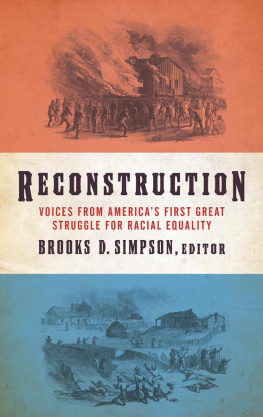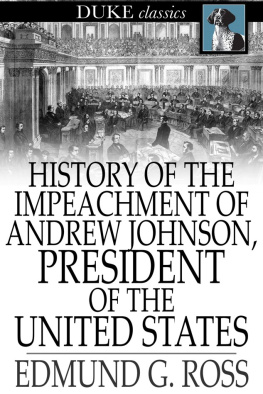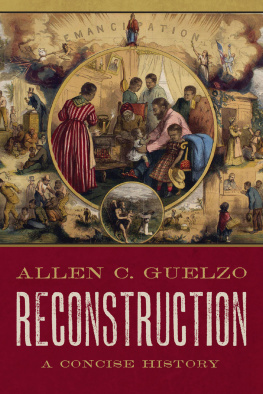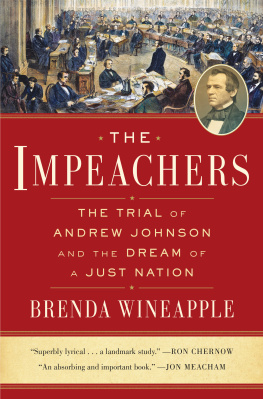
Library of America, a nonprofit organization,
champions our nations cultural heritage
by publishing Americas greatest writing in
authoritative new editions and providing resources
for readers to explore this rich, living legacy.
RECONSTRUCTION
VOICES FROM AMERICAS
FIRST GREAT STRUGGLE
FOR RACIAL EQUALITY
Brooks D. Simpson, editor

LIBRARY OF AMERICA E-BOOK CLASSICS
Volume compilation, introduction, notes, and chronology copyright 2018 by
Literary Classics of the United States, Inc., New York, N.Y.
All rights reserved.
No part of this book may be reproduced in any manner whatsoever without
the permission of the publisher, except in the case of brief
quotations embodied in critical articles and reviews.
Some of the material in this volume is reprinted
by permission of the holders of copyright and publication rights.
Every effort has been made to contact the copyright holders.
If an owner has been unintentionally omitted,
acknowledgment will gladly be made in future printings.
See Note on the Texts on page 688 for further information.
Published in the United States by Library of America.
LIBRARY OF AMERICA, a nonprofit publisher,
is dedicated to publishing, and keeping in print,
authoritative editions of Americas best and most
significant writing. Each year the Library adds new
volumes to its collection of essential works by Americas
foremost novelists, poets, essayists, journalists, and statesmen.
Visit our website at www.loa.org to find out more about
Library of America, and to sign up to receive our
occasional newsletter with exclusive interviews with
Library of America authors and editors,
and our popular Story of the Week e-mails.
Distributed to the trade in the United States
by Penguin Random House Inc.
and in Canada by Penguin Random House Canada Ltd.
Library of Congress Control Number: 2017939512
e-ISBN 978-1-59583-563-1
The Library of America303
Manufactured in the United States of America
Reconstruction:
Voices from Americas First Great Struggle
for Racial Equality
is published with support from
WILLIAM R. BERKLEY
and
THE BERKLEY FAMILY FOUNDATION
Contents
Introduction
M OST Americans dont know very much about Reconstruction, and in many cases what they may think they know is wrong. This shortcoming is understandable. Sometimes passed over in traditional high school or college history courses, the period can also be marginalized as an unseemly interval between the heroic drama of the Civil War and the advent of the tremendous economic, social, and political changes set into motion by the late nineteenth-century triad of industrialization, urbanization, and immigration. Popular imagination of the era in the early twentieth century was captured in two famous films based on best-selling novels, Birth of a Nation (1915) and Gone With the Wind (1939), both of which offered vivid portrayals of the persistence and eventual triumph of southern whites over the forces of evil represented by a malevolent alliance of greedy carpetbaggers, treacherous scalawags, and ignorant freedmen. Although some scholars challenged this perspectivemost notably, W.E.B. Du Bois in Black Reconstruction (1935)only in the 1950s did a wave of revisionist reassessment, inspired in part by the civil rights movement, begin to present different perspectives as historians debated the meaning of Reconstruction and why it turned out as it did. These debates have yet to become part of our popular memory. There is no gripping PBS series on Reconstruction comparable to Ken Burnss The Civil War, no compelling one-volume narrative history for general readers such as James M. McPhersons Battle Cry of Freedom, and no vivid popular novel with the enduring appeal of Michael Shaaras The Killer Angels. For many Americans, Reconstruction is not an essential part of our national story, or fundamental to our sense of who we are today. The exception to this marginalization is to be found in the consciousness of black America, where the invocation of forty acres and a mule powerfully evokes memories of an era of promise and betrayal.
This volume aims to help redress that imbalance. It brings to life the words and deeds of Americans as they battled each other over what the Civil War did, and did not, achieve, highlighting the struggle of African Americans to make freedom mean more than the absence of slavery, and recording how other Americans resisted that struggle for equality. In the twenty-first century too many Americans think of terrorism as a recent phenomenon brought to our shores by outsiders, erasing the fundamental role that merciless violence played in the preservation of white supremacy. Much is made today of the American promise, and yet during Reconstruction much of that promise went unfulfilled in what historian Eric Foner has termed an unfinished revolution.
A few words about the scope of this volume. Its aim is to collect contemporary writing by participants and observers that records and illuminates our first national attempt to imagine and build a biracial republic. The writings it presents focus on the status of the freed people in the South after the Civil War, on definitions of citizenship and the expansion of suffrage, on the national political struggles that shaped the course of Reconstruction, and on the white supremacist terrorism that resisted the movement toward equality. It is not intended to address every aspect of American public life during the Reconstruction era, and as a result does not encompass foreign policy, tariff legislation and civil service reform, industrial expansion and labor unrest, or westward expansion and the accompanying wars against the Indians. Moreover, while debates over reconstructing the republic began as far back as the secession winter of 186061, we have decided to start telling this story in 1865. A range of writings about wartime reconstruction, including the debate over emancipation and Lincolns struggles with congressional Republicans over the framing of policy, are available in the four-volume Library of America series The Civil War Told by Those Who Lived It (201114). Finally, while a case can be made that Reconstruction did not end in 1877, we have chosen to conclude our volume with the end of significant federal efforts to maintain Republican state governments in the South in the face of violence, intimidation, and the increasing desire of many northerners for an end to civil strife.
By 1865 the war had destroyed slavery, yet no one knew what a post-emancipation America would look like. Among those trying to find a way forward was Abraham Lincoln. His efforts to restore loyal state governments supported by white Unionists in the South had been repeatedly frustrated by the stubborn determination of most white southerners to defend slavery and secession. Over the course of the war he moved from advocating gradual compensated emancipation, followed by the voluntary colonization of at least some of the freed people outside the United States, to emancipation as a war measure and the enlistment of 180,000 black soldiers, to support for the Thirteenth Amendment and, in what turned out to be his last speech, advocacy of limited black suffrage. Yet the sixteenth president never abandoned his desire for the rapid restoration of elected civilian governments in the South, and his vision for what emancipation would ultimately mean remained incomplete up to the day of his death. Many Republicans sought a more thoroughgoing revolution in southern society, envisioning a prolonged military occupation of the region, the confiscation of planter estates, and their redistribution to the very people who had worked them as enslaved labor. Others supported efforts to establish schools for the freed people and to set them on the path to citizenship and the franchise. While Lincoln may have seen emancipation as a means toward the end of preserving the republic, black leaders reversed those priorities and used the war for union to push for emancipation and equal citizenship. During the war African Americans, in ways large and small, helped undermine and then demolish the institution Confederate vice president Alexander H. Stephens had celebrated as the corner-stone of the Confederacy.








